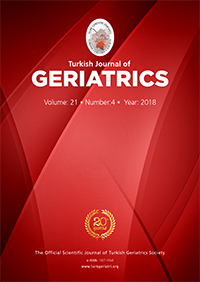2Çukurova University, Faculty of Medicine, Department of Physical Medicine and Rehabilitation, Adana, Turkey DOI : 10.31086/tjgeri.2018.59 Introduction: Vitamin D is known as an anti-inflammatory, antitumor, and immune-modulating hormone, which plays an important role in common diseases in the geriatric population, such as hypertension and cerebrovascular disorders. Vitamin D deficiency has been linked to various diseases in the literature. However, the association between vitamin D and multiple comorbidities remains unclear due to limited published data. The aim of the present study was to evaluate the association between vitamin D levels and multiple comorbidities in elderly patients.
Materials and Method: The study design was cross-sectional. Geriatric patients (aged ?65 years) who underwent serum 25(OH)D evaluation to determine the vitamin D status during the last 3 months were assessed for eligibility. Demographic data and 25(OH)D levels of patients were obtained from the electronic database of the hospital and a telephonic interview. In addition, a comorbidity questionnaire was completed via telephonic interviews. The correlation between comorbidity scores, demographic data, and vitamin D levels in elderly patients was analyzed.
Results: Data on 25(OH)D levels in 685 geriatric patients was obtained. Among these patients, 211 (169 female, 42 male) who were contacted over telephone were enrolled. The mean values for age, vitamin D level, and comorbidity scores were 70.4±5.0 years, 16.8±9.2 ng/ml, and 11.3±4.7, respectively. A moderate-good negative correlation was found between 25(OH)D levels and comorbidity scores (r=?0.503).
Conclusion: Low vitamin D levels were associated with total comorbidity status in geriatric patients. This result suggests that vitamin D deficiency may be a risk factor for comorbidities in geriatric patients.
Keywords : Comorbidity; Geriatrics; Vitamin D
